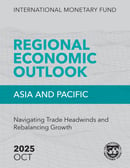This web page presents information about the work of the IMF in the Philippines, including the activities of the IMF Resident Representative Office. Additional information can be found on the Philippines and IMF country page, including IMF reports and Executive Board documents that deal with the Philippines.
At a Glance
At a Glance : Philippines's Relations with the IMF
- Current IMF membership: 191 countries
- Philippines joined the Fund in December 27, 1945; Article VIII
- Quota: SDR 879.90 million
- Outstanding Purchases and Loans: None
- The last Article IV Executive Board Consultation was on July 8, 2014 (Country Report 14/245)
Office Activities
PHILIPPINES: Macroeconomic Frameworks Technical Assistance: Scoping Mission
April 2, 2025
Money, Transformed: The Future of Currency in A Digital World
Finance and Development Magazine, June 2018
May 30, 2018
Bloomberg interview on the Philippine Economy
Resident Representative Yongzheng Yang discussed the latest outlook for the Philippines economy in an interview with Bloomberg TV which was aired on November 20, 2017.
November 20, 2017
Millennials and the Future of Work
Finance & Development Magazine, June 2017 Issue
September 8, 2017
World Economic Outlook Update, July 2017
The Global Economy Maintains Momentum
July 25, 2017
IMF's Work on the Philippines
No results found. Either there was an error with the web service or there is no data returned by the web service.
October 24, 2025

Navigating Trade Headwinds and Rebalancing Growth
Economies in the Asia-Pacific region have been resilient so far in 2025. Nevertheless, higher US tariffs will likely reduce external demand and eventually weigh on growth. Greater regional integration and structural reforms will be critical for sustainable growth.
Read the Report
Scam Alert
Fraudulent Scam Emails Using the Name of the IMF
We would like to bring to the notice of the general public that several variants of financial scam letters purporting to be sanctioned by the International Monetary Fund (IMF) or authored by high ranking IMF officials are currently in circulation, and may appear on official letterhead containing the IMF logo. The scam letters instruct potential victims to contact the IMF for issuance of a “Certificate of International Capital Transfer” or other forms of approval, to enable them receives large sums of monies as beneficiaries. The contact e-mail information is always BOGUS and unsuspecting individuals are then requested to send their personal banking details which the scammers utilize for their fraudulent activities.
Contrary to what is stated in these scam e-mails, letters, or phone conversations, the IMF does NOT authorize, verify, monitor, or assist in contract or inheritance payments between third parties and/or Governments, nor does it endorse the activities of any bank, financial institution, or other public or private agency. For purposes of clarification, the IMF is an inter-governmental organization whose transactions and operations are carried out directly with its member countries.
If you have already received such e-mails, you are advised to terminate all further contacts with the scammers, and, in the event that you have sent them funds, contact your local law enforcement agency immediately. If you are resident in the United States, you can also file a complaint with the US Federal Bureau of Investigation (FBI), through the following website: http://www.ic3.gov/default.aspx.
Additional general information on scam e-mails may be found at the following websites:
1) http://www.lookstoogoodtobetrue.com/
2) http://www.treas.gov/press/releases/js1130.htm



